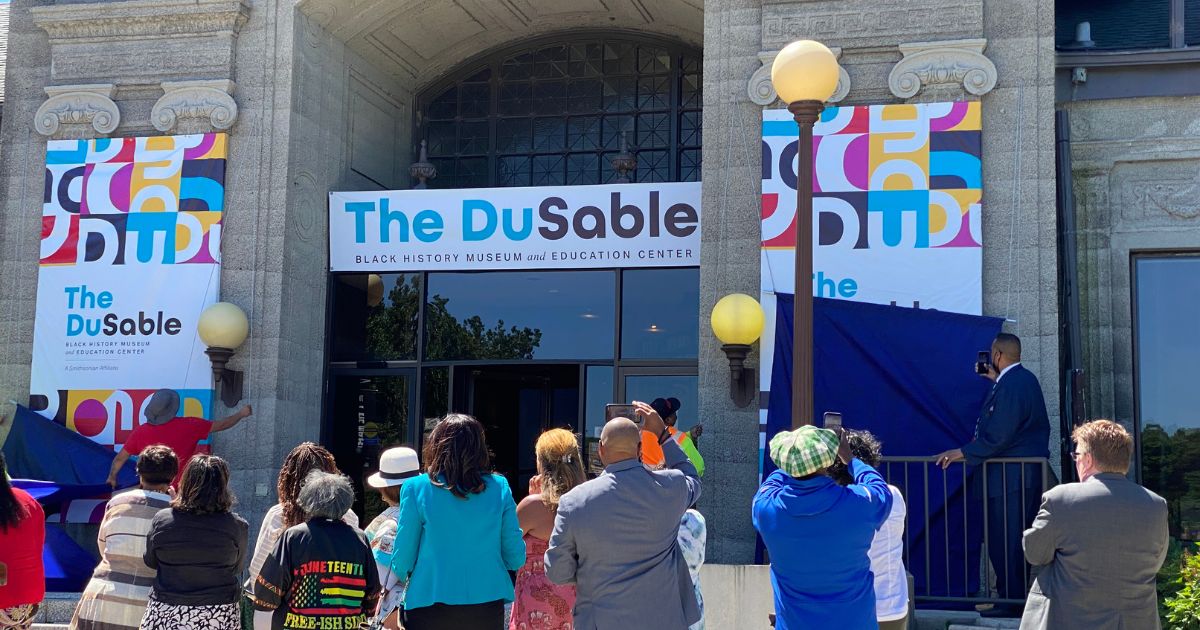The nation’s oldest museum that showcases African American history and culture is now called the DuSable Black History Museum and Education Center.
DuSable’s President Perri Irmer unveiled the new name during a special ceremony Juneteenth weekend. The event ushered in a new era as the DuSable stands at a critical crossroad in the museum’s 61-year history.
Battered by the pandemic, the iconic museum has rebranded itself to boost attendance, memberships and funding sources that DuSable officials hope will give the facility fresh momentum as they begin a new era.
Some are simply calling it “The Du,” but the official name was unveiled Saturday, June 18, when workers removed a cover from the museum’s old moniker and revealed a colorful, temporary marquee with the new name over the front entrance. A similar sign was placed on the east side of the Harold Washington wing along Cottage Grove.
“We’re fortunate to have valuable Black history available right in our back yard,” said Glen Eden, Board Chair from Choose Chicago, the city’s tourism agency. “The DuSable is truly a cultural staple in Chicago and treasure for all Chicagoans and people visiting from around the world.”
“I remember coming here as a kid from kindergarten to high school and every time I came here, I learned something new about me,” said Alderman Jeanette Taylor, whose ward includes the museum. “Everything you love about America came from Black people.”
District 3 Cook County Commissioner Bill Lowry said, “This museum in many ways mirrors what Juneteenth is to me. Juneteenth, like the DuSable, is a bridge. It’s a bridge which binds our past with our present and it also takes us to our tomorrow.”
Stricken with laryngitis, Irmer struggled to speak before the temporary marquee with the new name was unveiled.
“As we unveil our new name and image, we pay respects to our past, claim our roles as educators and speak to the power of our future. The origins and story of our people lies in freedom, not in slavery and history we make together in the days to come. It must start with the knowledge of everywhere we have been and everywhere we are.”
In recent years, the DuSable has struggled with dwindling attendance and financial problems and allegations of mismanagement under Irmer’s leadership. In 2020, the DuSable was given a $302,500 PPP loan that kept the museum open. In 2018, eight board members left the museum within months, fueling concerns that the DuSable was in trouble.
Along with the name change, the DuSable is expanding its educational outreach, which includes discussions with authors, educational programming and curriculum surrounding Black studies. The museum also seeks to boost its appeal to younger audiences by offering special exhibits like “The March” and “Equiano,” which tells the story of an African boy who was sold into slavery.
Dr. Kim L. Dulaney, Vice President of Education and Programs, said “DuSable Museum has always been involved in education. We know that he who controls the education controls understanding. The DuSable has always been involved in education. Dr. [Margaret T.] Burroughs was an educator herself.”
The museum plans to provide its resources to support Chicago Public Schools and colleges throughout the city in community education.
For a significant event that largely impacts the museum’s future, the event drew a small turnout of supporters on a weekend where admission to the museum was free.
Noticeably absent were Mayor Lori Lightfoot and Cook County Board President Toni Preckwinkle, a close friend of Irmer. Chicago Park District Superintendent Rosa Escareño came on behalf on Mayor Lightfoot, who had another commitment that morning.
Adrienne Irmer, Perri’s daughter who is associate vice president for external affairs at the Illinois Institute of Technology, spoke, but Peggy Montes, DuSable’s prominent chairman emeritus, did not.
About 120 people attended the event on the museum’s large courtyard, which was flooded with over 500 people last year in the inaugural Juneteenth national holiday.
Some say the low turnout could be attributed to the many Juneteenth events happening during the weekend, but most of those events began in the afternoon and on Sunday, June 19. Very few Juneteenth events on the South Side were held at the same time of the DuSable’s rebranding ceremony, which started at 10 a.m.
The museum’s new name change is not generating much excitement among people who talked to the Crusader. Some say the museum’s decision to replace “African American” with “Black” as part of the name was a bad decision. They say the change diminishes people to just being a color rather than promoting ethnic African identity at a time when many African Americans are researching their lineage while appreciating their roots in their homeland across the Atlantic.
“I don’t get the new name,” said Sylvia Jones from Chatham. “This just shows you the thinking of these people.”
One museum visitor said the museum’s name reminds her of the Black Lives Matter movement. The woman who declined to give her name, said she prefers African American because it has deeper and cultural connotations.
Zenobia Johnson Black, the widow of historian Timuel Black who attended the unveiling, said she likes the name.
“I think the new name will be an improvement to the museum because it could generate ten times more funding and it will tell the story of all Black people.”






